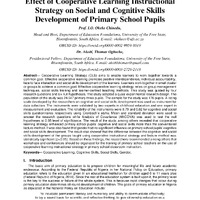Item
Effect of Cooperative Learning Instructional Strategy on Social and Cognitive Skills Development of Primary School Pupils
- Title
- Effect of Cooperative Learning Instructional Strategy on Social and Cognitive Skills Development of Primary School Pupils
- Author(s)
- Okeke, C.I.O., & Akobi, T.O. See all items with this value
- Date
- 2022 See all items with this value
- Description
-
Cooperative Learning Strategy (CLS) aims to enable learners to work together towards a common goal. Effective cooperative learning promotes positive interdependence, individual accountability, face to face interaction and social skills development of the learners. Learners work together in small cluster or groups to achieve a common goal. Effective cooperative learning strategy relies on group management techniques, social skills training and learner-centred teaching methods. This study was guided by four research questions and six null hypotheses. The study adopted a quasi-experimental research design. The population of the study was 24,547 primary three pupils. The sample for the study was 176 pupils. A rating
scale developed by the researchers on cognitive and social skills development was used as instrument for data collection. The instruments were validated by two experts in childhood education and one expert in measurement and evaluation. The reliability of the instruments were 0.79 and 0.82 for cognitive and social skills questionnaires respectively using Cronbach’s alpha. Mean and standard deviation were used to answer the research questions while Analysis of Covariance (ANCOVA) was used to test the null
hypotheses at 0.05 level of significance. The result of the study, among others revealed that cooperative learning strategy enhanced primary school pupils’ cognitive and social skills more than the conventional lecture method. It was also found that gender had no significant influence on primary school pupils’ cognitive and social skills development. The result also showed that the difference between the cognitive and social skills development of the groups taught using cooperative instructional strategy and lecture method was statistically significant (p<0.05). Based on these findings, the researchers recommended among others that workshops and conferences should be organized for the training of primary school teachers on the use of cooperative learning instructional strategy in primary school classroom instruction. - Publisher
- International Journal of Early Childhood Special Education (INT-JECSE) See all items with this value
- Identifier
- DOI
- Keywords
- Cooperative Learning, Cognitive Skills, Social Skills, Gender See all items with this value
- pages
- 2630-2639
- volume
- 14
- issue
- 6
- Item sets
- Journal Articles
- Media
-
 PDF
PDF

